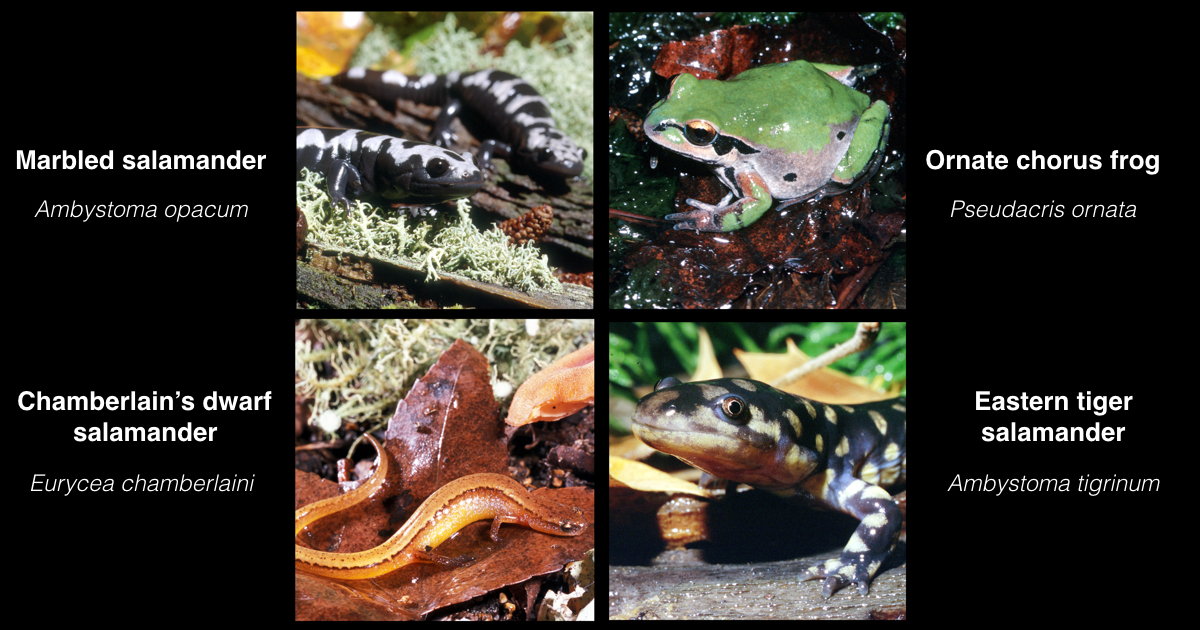Amphibian Ecology in Geographically Isolated Wetlands
A special issue of Diversity (ISSN 1424-2818). This special issue belongs to the section "Animal Diversity".
Deadline for manuscript submissions: closed (31 December 2022) | Viewed by 51233

Special Issue Editors
2. Odum School of Ecology, University of Georgia Athens, Athens, GA 30602, USA
Interests: amphibian ecology; conservation ecology; molecular ecology; ecotoxicology
Special Issue Information
Dear Colleagues,
Although there might be some disagreement regarding what to name the habitat itself, there is no doubt that geographically isolated wetlands (GIW) are essential habitats for numerous amphibian species worldwide. Because many pond-breeding amphibian species have limited capacities to persist in aquatic systems with fish, fish-free wetlands—which many GIW are—often harbor more (and different) species than typical pond or lake ecosystems. Our interest in this Special Issue of Diversity is in how these unique habitats—i.e., GIW—affect and select for the ecology of pond-breeding amphibian species. For example, at the landscape level, we think that GIW diversity, in terms of size, scale, and/or hydroperiod, promotes species diversity. Species differ in their responses to biotic (e.g., predation pressure, density, pathogens) and abiotic (e.g., hydroperiod, contaminants, water chemistry) stressors. Thus, the unique aspects of GIW environments and their biotic and abiotic factors likely influence species’ morphologies, life histories, and evolutionary trajectories. The GIW environments influence not only single-species ecology, but also community-level interactions and ecosystem-level processes, such as nutrient flux. At a metapopulation level, the distribution of GIW on the landscape certainly affects single-species and community-level persistence by influencing local extinction and recolonization rates. All aspects of the interplay between amphibian ecology and GIW are encouraged as submissions for this Special Issue.
Dr. Stacey Lance
Mr. David E. Scott
Guest Editors
Manuscript Submission Information
Manuscripts should be submitted online at www.mdpi.com by registering and logging in to this website. Once you are registered, click here to go to the submission form. Manuscripts can be submitted until the deadline. All submissions that pass pre-check are peer-reviewed. Accepted papers will be published continuously in the journal (as soon as accepted) and will be listed together on the special issue website. Research articles, review articles as well as short communications are invited. For planned papers, a title and short abstract (about 250 words) can be sent to the Editorial Office for assessment.
Submitted manuscripts should not have been published previously, nor be under consideration for publication elsewhere (except conference proceedings papers). All manuscripts are thoroughly refereed through a single-blind peer-review process. A guide for authors and other relevant information for submission of manuscripts is available on the Instructions for Authors page. Diversity is an international peer-reviewed open access monthly journal published by MDPI.
Please visit the Instructions for Authors page before submitting a manuscript. The Article Processing Charge (APC) for publication in this open access journal is 2100 CHF (Swiss Francs). Submitted papers should be well formatted and use good English. Authors may use MDPI's English editing service prior to publication or during author revisions.
Keywords
- Amphibian
- Geographically isolated wetlands (GIW)
- Pond-breeding amphibian species
- Community-level interactions
- Ecosystem-level processes
- Nutrient flux
- Metapopulation
Benefits of Publishing in a Special Issue
- Ease of navigation: Grouping papers by topic helps scholars navigate broad scope journals more efficiently.
- Greater discoverability: Special Issues support the reach and impact of scientific research. Articles in Special Issues are more discoverable and cited more frequently.
- Expansion of research network: Special Issues facilitate connections among authors, fostering scientific collaborations.
- External promotion: Articles in Special Issues are often promoted through the journal's social media, increasing their visibility.
- Reprint: MDPI Books provides the opportunity to republish successful Special Issues in book format, both online and in print.
Further information on MDPI's Special Issue policies can be found here.






